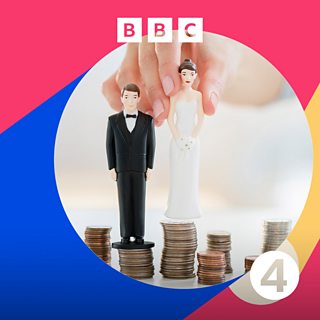Eight things you need to know about money and love
Couples may share everything but that doesn't necessarily extend to their finances. Increasingly, partners live together, share the costs but keep separate bank accounts for their own spending.
So what can couples do to make sure their finances won't derail their relationships? Felicity Hannah has been finding out, in a special edition of Βι¶ΉΤΌΕΔ Radio 4's Money Box Live, dedicated to love and money.
She speaks to Laura Suter, head of personal finance at AJ Bell, Nigel Shepherd, specialist family lawyer and consultant with Mills & Reeve, and etiquette coach and podcaster William Hanson. Here are eight things worth knowing to keep your relationship – and your bank balance – in good health.

1. How you spend on a date matters
Before even getting into a relationship, there's the minefield of how to split the bill on a date. So is it best to divide the cheque or impress a date by scooping it up first and paying? William Hanson, etiquette coach and presenter of the podcast Help I Sexted My Boss, says it's all about being mindful of how much the other person can spend.
There's no point going to the Ritz on date one and then taking them to a fast food chain on date two.William Hanson, etiquette coach
“I think it's 50:50, divided equally," he says. "But I think personally, if the date's going well and you think there's going to be date two or three, it's nicer just for one person to pay, it's their treat and then on the next date the other person pays. But it's important to get the reciprocity right, so there's no point going to the Ritz on date one and then taking them to a fast food chain on date two, because that's just not fair.”
So what are the worst financial breaches of etiquette on a romantic night out? “Being over fussy with the bill, particularly if you're going down the sharing the bill route,” says Hanson. “Going, 'Oh well you had the beef Wellington which was £2 more expensive than the pasta I had, so you pay £2 more.' I think if you are really that fastidious with the bill and you're counting the pennies, my advice would be don’t go out for dinner for the date, go for a coffee or something cheaper.”
2. Talk about money little and often
It's not exactly whispering sweet nothings to each other but talking about finances as a couple really matters.

And a couple should start those conversations “as soon as possible”, says Laura Suter, head of personal finance at AJ Bell. “That could be saying you don't want to go on a particular date because you can't afford it, or acknowledging early on that there might be an income disparity. I think it's always good to have these brief talks about money, they don't need to be heavy long discussions, but mentioning money early on so that it doesn't seem like such a taboo.”
Suter feels it helps to be upfront. “It's much better to talk about these things early on, before you commit to things for example rent that you ultimately can't afford,” she says. “But also before you get into bigger financial issues and end up having to talk about all of it all at once.”
3. There is no such thing as a 'common law marriage'
Although it's very normal now for couples to live together before or without getting married, it's important to know about the different financial protections.
“It's really important to say that cohabitants between themselves have no legal rights in the same way as married couples," says Nigel Shepherd, specialist family lawyer and consultant with Mills & Reeve. “There's this myth that after a certain time living together you get the same kinds of rights.”
However, there are ways for unmarried couples to formalise their shared finances through a cohabitation contract or a declaration of trust if there's a shared property.
Suter adds: “People talk about the financial benefits of getting married but people shouldn't run into that just for the financial benefits before they feel ready because going through divorce is a costly, long process.”
4. Not being in a relationship can be pricey
Although some people might enjoy treating their partners, it's still far more expensive to be single. Not being able to split bills, share food and pool money with a partner can mean a single person typically spends £9,769 a year more than someone living with a partner, according to analysis by uSwitch.
A single person typically spends Β£9,769 a year more than someone living with a partner.
“If you think about upfront rent to subscriptions to holidays, you don't have anyone to split the bill with and so you end up footing far more,” explains Laura Suter. “What's also interesting is, in our research, we found single people on average are saving less, putting less into their pension and are generally less confident about their financial futures.”
5. You cannot be responsible for your partner's debts
Although couples' credit files might show a connection, that doesn't mean they each become responsible for the other’s borrowing.
“You're not responsible for your partner's debts,” says Nigel Shepherd. “You are responsible for joint debts and if you've got a joint debt the institution will come after the one they think they're more likely to get the money off.”
6. Relationships can change your credit file
Love is a linking of hearts but, less romantically, it's also a linking of credit files.
“Just the act of getting married doesn't necessarily link your credit histories, nor does living together,” says Laura Suter. “However, if you apply for any credit together, even just a joint savings account or current account, or loans, mortgages, things like that. At that point your partner's credit rating will be taken into account as well as yours.
“That could well impact how much you end up paying for the account, the interest rate on it for example. Or, if one of your credit ratings is very bad then you could get declined.”
7. Divorce costs money – a lot of money
“For the actual application for divorce it's £593. It’s a lot of money. You can get help with those fees if you're on lower incomes, go onto the government website to do that and there’s an eligibility checker,” says Nigel Shepherd. There are different systems in and .
A separating couple may still need legal support to untangle their affairs, however, research from the University of Bristol that shows more than 100,000 couples divorce in England and Wales every year – but only a third of them use the legal system to sort out their finances.
The majority negotiate their own arrangements or in the worst cases, reach no settlement at all. As Shepherd says: “The important thing is that, if you are able to put some money together to get at least some early legal advice, to dispel myths and misunderstandings, that really will be money well spent, because the consequences of getting it wrong will cost thousands and thousands of pounds more.”
Research carried out by AJ Bell shows that three-quarters of couples who divorced didn't take their pensions into account, for example, which can leave one partner at financial risk in their old age.
8. Working together on financial goals helps to keep the love
Keiron contacted Money Box Live to say that he and his wife had been married 55 years – and to share some financial wisdom.“When we got married at 18, we saved all my wages of £7 to buy a house… living off my wife's wage. We had tins on the mantel piece for different payments when most bills were cash only.
We believe in the saying: 'When poverty comes in at the door, love flies out of the window.'Caller Keiron
“We each had our own spending money of half a crown a month, approximately £5 in today's money.”
Keiron says to start early when it comes to savings: “We both believe in the saying: 'When poverty comes in at the door, love flies out of the window'.”
For more advice from the panel (including their response to one caller who asked if she should marry her long-term partner!) listen to the episode in full on Βι¶ΉΤΌΕΔ Sounds now.
The information contained in this article was correct at the time of broadcast on 8 November, 2023.
More from Βι¶ΉΤΌΕΔ Radio 4
-
![]()
What to do if you think you've been scammed
Advice on what to do next if you fall foul of the fraudsters.
-
![]()
Eight things you need to know about student loans and finance
Tips on how to budget, pay bills and manage your uni finances.
-
![]()
Cost of living: Who's thriving and who's just surviving?
How householders and small businesses have been impacted by the crisis.
-
![]()
How much money do you need to be happy?
Adam Shaw explores the ins and outs of money’s relationship to wellbeing.





